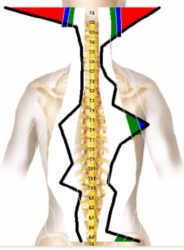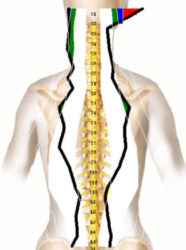Headaches, especially migraines, affect many people’s quality of life. Severe headaches or migraines are very common, women being more than twice as likely to experience debilitating headaches (10% of men, and 21.8% of women based on a 2009 CDC review) (1). Migraine sufferers are often given medication to cope, and sometimes a long list of possible trigger foods, without any other options.
Over the counter painkillers like aspirin are not without risk when taken habitually, and migraine medications especially are hard on the cardiovascular system overtime, increasing stroke risk. I believe for a woman with a family history of cardiovascular disease, especially using other commonly prescribed medications with added risk, such as hormonal birth control, this is a recipe for disaster. It is always worth trying the path of least harm first, and these are what I’ve found to be the best tools in my toolbox to treat and prevent migraines and headaches.
1. Chiropractic care
Chiropractic care is well known to provide very effective relief for headaches and migraines, reducing their frequency and severity, and often stopping them completely, reducing or entirely eliminating the need to depend on medication to cope (2). While chiropractic is not intended to treat any condition or illness, even back pain, it is intended to restore proper lines of nerve communication between the brain and body, and bring the body to its optimal functioning state.
Below is an excellent example of a patient who had migraines triggered by a long commute twice weekly. This EMG scan shows how much stress the motor nerves were under before beginning chiropractic care. Even without eliminating the triggering activity, this patient experienced almost immediate relief, with a continued decrease in migraine frequency and severity through the next 24 visits, to the third scan on the right.


2. Food Sensitivity Testing
For tough cases who have not experienced adequate headache relief from chiropractic care alone, I strongly recommend taking an igG food sensitivity test, which we can do quickly and easily in the office with a finger prick blood spot test. We send it to the lab, and within 2 weeks, you have a customized list showing you exactly which foods are triggering an immune response in your body.
This test isn’t just a life-changer for those with chronic headaches and migraines, I also highly recommend it to those with irritable bowel syndrome, bad seasonal allergies and skin conditions, like excema, and those managing autoimmune disease.
3. CBD Hemp Oil
 CBD oil is a powerful anti-inflammatory that I recommend trying to anyone currently relying on over the counter pain relievers for headaches or muscle and joint pain. It has been found to be effective at preventing migraines or reducing the severity for many patients. It is also effective for anxiety, stomach, and sleep problems, and does not cause the psychoactive effects of inhaling or ingesting THC, which were the only negative side-effects of cannabis use reported by those using it for migraines in studies (3) (Although, let’s be clear, inhaling smoke is never good for one’s health). Even if you enjoy your THC buzz, CBD oil is optimal if you’re looking for the best way to deliver the tremendous medicinal benefits of cannabis.
CBD oil is a powerful anti-inflammatory that I recommend trying to anyone currently relying on over the counter pain relievers for headaches or muscle and joint pain. It has been found to be effective at preventing migraines or reducing the severity for many patients. It is also effective for anxiety, stomach, and sleep problems, and does not cause the psychoactive effects of inhaling or ingesting THC, which were the only negative side-effects of cannabis use reported by those using it for migraines in studies (3) (Although, let’s be clear, inhaling smoke is never good for one’s health). Even if you enjoy your THC buzz, CBD oil is optimal if you’re looking for the best way to deliver the tremendous medicinal benefits of cannabis.
There are a lot of bunk CBD products that don’t meet the standards of a true, pure medicinal grade product. I’m planning on offering this to patients soon, but in the meantime, here is a good article on what to look for when shopping for CBD hemp oil.
Sources:
- Pleis JR, Ward BW, Lucas JW. Summary health statistics for U.S. adults: National Health Interview Survey, 2009 (provisional report). Vital Health Stat 2010;10(249). Available at http://www.cdc.gov/nchs/data/series/sr_10/sr10_249.pdf
 .
. - Vernon HT. The effectiveness of chiropractic manipulation in the treatment of headache: an exploration in the literature. J Manipulative Physiol Ther. 1995 Nov-Dec;18(9):611-17. Available at https://www.ncbi.nlm.nih.gov/pubmed/8775024.
- Danielle N Rhyne, Sarah L Anderson, Margaret Gedde, Laura M Borgelt. Effects of Medical Marijuana on Migraine Headache Frequency in an Adult Population.Pharmacotherapy. 2016 Jan 9. Epub 2016 Jan 9. Available at https://www.ncbi.nlm.nih.gov/pubmed/26749285.

